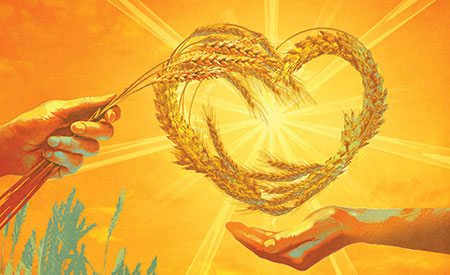Holidays
Shavuot
Cultivating Kindness on Shavuot

Ever experience an act of kindness that made you feel good about the world all over again? Life today feels like it could use the magical dust of goodwill to soften its harshness. Shavuot—the festival that celebrates the giving of the Torah and begins this year on June 8—offers object lessons in kindness, lessons we can use to supercharge our interactions with a little gentleness. In a midrash, Rabbi Zeira said of the Book of Ruth, which is read on the holiday: “This scroll does not contain the laws of impurity or purity, or prohibitions or permissions, so why was it written? To teach you how good is the reward for those who do kindness!” (Ruth Rabba 2:14).
Small acts of caring can change worlds, affirming our capacity for generosity. Such is the opinion of Rabbi Elazar: “Anyone who performs charity and justice is considered as if he filled the whole world in its entirety with kindness” (Sukka 49b). In the spirit of the holiday, speak to a homeless person and offer a gift of food instead of shutting yourself away from human suffering. Call someone a few months after an operation or check in with a mourner long past the shiva, when the reality of the loss sets in. Shower the world with acts of concern in these polarizing times. Reach across the political aisle and invite guests to your Shabbat or holiday table who don’t vote like you.
Is it really possible for acts of kindness to have such an extraordinary reach?
Rabbi Elazar believes so. He writes that charity is greater than (Temple) sacrifices and acts of kindness are greater still. You can give charity and not be sure if it will have the desired effect. But when you perform an act of kindness, you can always be sure that your warmth, affection and concern will touch someone.
Other sages said that acts of kindness are superior to charity in three respects: Charity can be performed only with one’s money, while acts of kindness can be performed both with one’s personal effort and one’s wealth. Charity is usually reserved for the poor, but kind acts are performed both for the poor and the rich. Charity is given to the living while acts of compassion are performed for the living and the dead—for example, when burying someone and honoring his or her memory. In other words, kindness involves the totality of ourselves in relationship to the totality of another.
In the Book of Ruth, all of these acts of kindness are represented. Naomi, the story’s protagonist who loses her husband and sons, praises Ruth, her daughter-in-law, for the kindness she showed her. Naomi also thanks Ruth and Orpah, her other Moabite daughter-in-law, for accompanying her on her trip back home from Moab—never expecting Ruth to follow her all the way back to Bethlehem. Boaz, a wealthy landowner and relative, praises Ruth’s kindness to Naomi; he, in turn, allows her to glean in his field. Boaz and Ruth eventually marry and, together, they help to rehabilitate the mourning Naomi through the birth of a grandchild, generously allowing Naomi and her friends to name the baby.
The consideration on display in the Book of Ruth shows a series of caring relationships that are unexpected, where compassion has the power to alter those relationships: a daughter-in-law to a mother-in-law, a wealthy landowner to a widow and convert, new parents to a vulnerable matriarch.
Shavuot challenges us to extend kindnesses, especially in relationships where it is least expected. Small and constant interactions can rebuild a universe of trust, love and friendship.
Who could benefit most from your kindness?
Erica Brown, Ph.D., is a writer and educator. Her most recent book is Jonah: The Reluctant Prophet.










 Facebook
Facebook Instagram
Instagram Twitter
Twitter
Leave a Reply